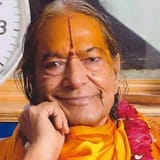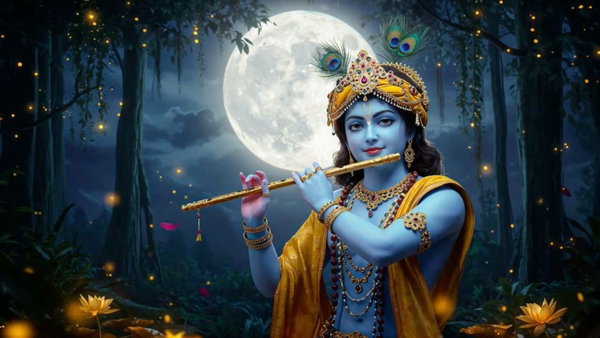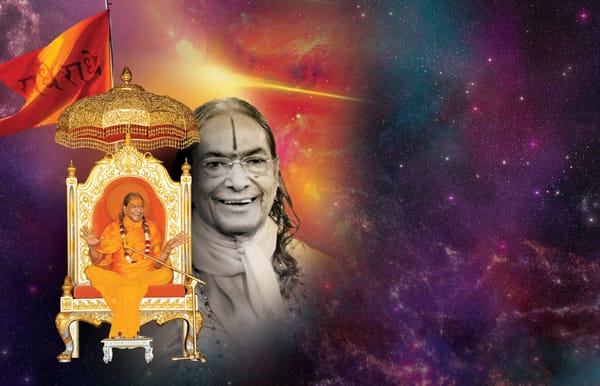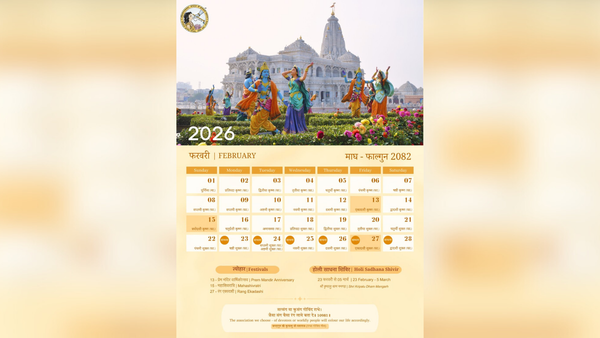Daily Devotion - Aug 8, 2025 (English)- The Mirage of Happiness

Every person in this world is unhappy, incomplete, and yearning for bliss. When someone becomes weary of the world and finds nothing fulfilling, they turn to God and say:
"My Guru has taught me not to ask God for worldly enjoyment (bhukti) nor liberation (mukti)."
Maya's influence extends up to Brahmalok. Those who perform grand sacrificial rites to attain heaven are utterly foolish because the spiritual practices prescribed for attaining heaven are impossible to perform in Kaliyug - they are far too difficult. And even if one manages to attain heaven, it is no different from earth - Maya has complete control there as well. Lust, anger, greed, and attachment hold their authority there, too. Heaven is also material, mayik, and one must return even after eventually reaching Brahmalok. Bhukti implies that the soul is separate from Brahm - the happiness experienced in the world is not divine bliss but merely the joy of Maya. 99.9% of people desire bhukti. Therefore, you should never ask God for it.
In mukti, the soul becomes one with Brahm - this is called ekatva (oneness), kaivalya, or sāyujya mukti. At first glance, merging with God may appear desirable, since one never returns to the material world, and Maya does not dare to approach them again. But this is not the case - mukti is even worse than bhukti.
Gauranga Mahaprabhu said:
"ajñāna tamera nāma kahiye kaitava, dharma artha kāma mokṣa ādi saba"
Kaitava means deceit, fraud, trickery - worldly pleasures have deceived the soul, who is the child of God. That is why, forgetting God, the soul runs after worldly pleasures. This is kaitava.
There are four kinds of kaitava - dharma (righteousness), artha (wealth), kama (desires), and moksh (liberation). Bhagavatam says in the beginning - "dharmaḥ projjhita kaitavaḥ." It is understandable why dharma, artha, and kama are considered kaitava, as they only lead one to Brahmalok. But why is moksh also considered kaitava?
Gauranga Mahaprabhu explained:
"tāra madhye mokṣa vāñchā kaitava pradhāna" - Among dharma, artha, kama, and moksh, moksh is the greatest deceiver. This is because one who merges with God never experiences the bliss of divine love. Since "na sa punarāvartate" - they never return and never receive a body again. And without a body, how can one taste the bliss of divine love?
However, as long as you remain within dharma, artha, and kama, there remains a chance of meeting a true saint. That saint may awaken your intellect, and through surrender and proper sadhana, you may one day experience divine love. Many great sinners have become true devotees of God. But after moksha, the soul is gone forever.
Thus, the devotee says he desires neither bhukti nor mukti. Then God asks, "What do you seek?"
The devotee replies - "I wish only to serve You - this is my sole desire."
Therefore, you should ask God only for the opportunity to serve Him - and that too, solely for His happiness. The uneducated Gopis had only one mantra - they surrendered their body, mind, and wealth to Shyamasundar, solely for His joy. And where did that mantra take them? Even Brahma, the creator of the universe, longs for the dust of their feet. Great sages like Sanak and Janak took birth as trees in Vraj just to receive that dust. You should desire only His happiness.
That is why the devotee says, "I ask only for your service - nothing else."
Recommended books by Jagadguru Shri Kripalu Ji Maharaj related to this topic:





